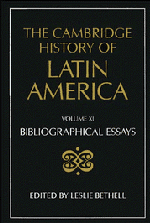Book contents
- Frontmatter
- I THE INDIGENOUS PEOPLES OF MIDDLE AND SOUTH AMERICA ON THE EVE OF THE CONQUEST
- II COLONIAL SPANISH AMERICA
- III COLONIAL BRAZIL
- IV THE INDEPENDENCE OF LATIN AMERICA
- V LATIN AMERICA: ECONOMY, SOCIETY, POLITICS, c. 1820 TO c. 1870
- VI LATIN AMERICA: ECONOMY, SOCIETY, POLITICS, c. 1870 to 1930
- VII LATIN AMERICA: ECONOMY, SOCIETY, POLITICS, 1930 to c. 1990
- 1 Population
- 2 The Latin American economies, 1929–1939
- 3 The Latin American economies, 1939–c. 1950
- 4 The Latin American economies, 1950–1990
- 5 Urban growth and urban social structure
- 6 Agrarian structures
- 7 State organization
- 8 Democracy
- 9 The Left
- 10 The military in politics
- 11 The urban working class and labour movements
- 12 Rural mobilizations
- 13 Women in twentieth-century Latin America
- 14 The Catholic church
- 15 The Protestant churches
- 16 Mexico, c. 1930–1946
- 17 Mexico since 1946
- 18 Central America
- 19 Guatemala
- 20 El Salvador
- 21 Honduras
- 22 Nicaragua
- 23 Costa Rica
- 24 Panama
- 25 The Panama Canal Zone, 1904–1979
- 26 Cuba, c. 1930–1959
- 27 Cuba since 1959
- 28 The Dominican Republic
- 29 Haiti
- 30 Puerto Rico
- 31 Argentina, 1930–1946
- 32 Argentina since 1946
- 33 Uruguay
- 34 Paraguay
- 35 Chile, c. 1930–c. 1960
- 36 Chile since c. 1960
- 37 Peru, 1930–c. 1960
- 38 Peru since c. 1960
- 39 Bolivia
- 40 Colombia
- 41 Ecuador
- 42 Venezuela
- 43 Brazil
- VIII IDEAS IN LATIN AMERICA SINCE INDEPENDENCE
- IX LATIN AMERICAN CULTURE SINCE INDEPENDENCE
- X THE INTERNATIONAL RELATIONS OF LATIN AMERICA SINCE INDEPENDENCE
- THE CAMBRIDGE HISTORY OF LATIN AMERICA
8 - Democracy
from VII - LATIN AMERICA: ECONOMY, SOCIETY, POLITICS, 1930 to c. 1990
Published online by Cambridge University Press: 28 March 2008
- Frontmatter
- I THE INDIGENOUS PEOPLES OF MIDDLE AND SOUTH AMERICA ON THE EVE OF THE CONQUEST
- II COLONIAL SPANISH AMERICA
- III COLONIAL BRAZIL
- IV THE INDEPENDENCE OF LATIN AMERICA
- V LATIN AMERICA: ECONOMY, SOCIETY, POLITICS, c. 1820 TO c. 1870
- VI LATIN AMERICA: ECONOMY, SOCIETY, POLITICS, c. 1870 to 1930
- VII LATIN AMERICA: ECONOMY, SOCIETY, POLITICS, 1930 to c. 1990
- 1 Population
- 2 The Latin American economies, 1929–1939
- 3 The Latin American economies, 1939–c. 1950
- 4 The Latin American economies, 1950–1990
- 5 Urban growth and urban social structure
- 6 Agrarian structures
- 7 State organization
- 8 Democracy
- 9 The Left
- 10 The military in politics
- 11 The urban working class and labour movements
- 12 Rural mobilizations
- 13 Women in twentieth-century Latin America
- 14 The Catholic church
- 15 The Protestant churches
- 16 Mexico, c. 1930–1946
- 17 Mexico since 1946
- 18 Central America
- 19 Guatemala
- 20 El Salvador
- 21 Honduras
- 22 Nicaragua
- 23 Costa Rica
- 24 Panama
- 25 The Panama Canal Zone, 1904–1979
- 26 Cuba, c. 1930–1959
- 27 Cuba since 1959
- 28 The Dominican Republic
- 29 Haiti
- 30 Puerto Rico
- 31 Argentina, 1930–1946
- 32 Argentina since 1946
- 33 Uruguay
- 34 Paraguay
- 35 Chile, c. 1930–c. 1960
- 36 Chile since c. 1960
- 37 Peru, 1930–c. 1960
- 38 Peru since c. 1960
- 39 Bolivia
- 40 Colombia
- 41 Ecuador
- 42 Venezuela
- 43 Brazil
- VIII IDEAS IN LATIN AMERICA SINCE INDEPENDENCE
- IX LATIN AMERICAN CULTURE SINCE INDEPENDENCE
- X THE INTERNATIONAL RELATIONS OF LATIN AMERICA SINCE INDEPENDENCE
- THE CAMBRIDGE HISTORY OF LATIN AMERICA
Summary
In spite of the apparently vast bibliography dealing with democracy in Latin America, there are many surprising gaps in the literature, particularly in terms of the development of truly comparable studies across countries and through time. The study of governmental and political institutions, which attracted attention especially among U.S. political scientists studying Latin American in the 1940s and 1950s, increasingly fell into disfavor through the 1960s and 1970s. This was a consequence initially of the sometimes excessive formalism of the earlier literature and of the onslaught of behavioralist perspectives (which did lead to many electoral studies); subsequently, it reflected the effects of dependency approaches which often viewed political processes as epiphenomenal, and then of the wave of military governments that swept through the region in the late 1960s and 1970s. With the transitions to civilian rule in the late 1970s and in the 1980s, and a concomitant revalorization of political democracy and of the importance of the study of institutions, there was a burgeoning literature on democracy in individual Latin American countries, as well as in a comparative perspective.
This essay focuses almost exclusively on comparative publications, apart from a selected list of constitutional works. Several of the social or corporate actors central to democracy, such as labour, the left and the military, receive special attention in other bibliographical essays and are barely noted here. The country-specific bibliographical essays provide references to the essential country-specific literature on such issues as the history of democracy, political parties, elections and public policy.
- Type
- Chapter
- Information
- The Cambridge History of Latin America , pp. 573 - 585Publisher: Cambridge University PressPrint publication year: 1995



